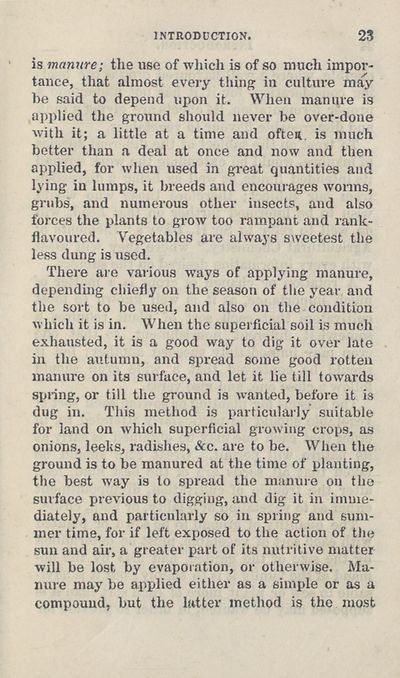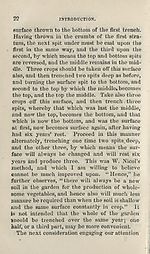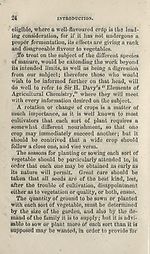Occupations > Abercrombie's improved practical gardener; with a monthly calendar for the flower garden
(27)
Download files
Complete book:
Individual page:
Thumbnail gallery: Grid view | List view

1NTR0DDCTI0N.
23
is manure; the use of which is of so much impor¬
tance, that almost every tiling in culture may
be said to depend upon it. When manure is
applied the ground should never be over-done
with it; a little at a time and often, is much
better than a deal at once and now and then
applied, for when used in great quantities and
lying in lumps, it breeds and encourages worms,
grubs, and numerous other insects, and also
forces the plants to grow too rampant and rank-
flavoured. Vegetables are always sweetest the
less dung is used.
There are various ways of applying manure,
depending chiefly on the season of the year and
the sort to be used, and also on the condition
which it is in. When the superficial soil is much
exhausted, it is a good way to dig it over late
in the autumn, and spread some good rotten
manure on its surface, and let it lie till towards
spring, or till the ground is wanted, before it is
dug in. This method is particularly suitable
for land on which superficial growing crops, as
onions, leeks, radishes, &c. are to be. When the
ground is to be manured at the time of planting,
the best way is to spread the manure on the
surface previous to digging, and dig it in imme¬
diately, and particularly so in spring and sum¬
mer time, for if left exposed to the action of the
sun and air, a greater part of its nutritive matter
will be lost by evaporation, or otherwise. Ma¬
nure may be applied either as a simple or as a
compound, but the latter method is the most
23
is manure; the use of which is of so much impor¬
tance, that almost every tiling in culture may
be said to depend upon it. When manure is
applied the ground should never be over-done
with it; a little at a time and often, is much
better than a deal at once and now and then
applied, for when used in great quantities and
lying in lumps, it breeds and encourages worms,
grubs, and numerous other insects, and also
forces the plants to grow too rampant and rank-
flavoured. Vegetables are always sweetest the
less dung is used.
There are various ways of applying manure,
depending chiefly on the season of the year and
the sort to be used, and also on the condition
which it is in. When the superficial soil is much
exhausted, it is a good way to dig it over late
in the autumn, and spread some good rotten
manure on its surface, and let it lie till towards
spring, or till the ground is wanted, before it is
dug in. This method is particularly suitable
for land on which superficial growing crops, as
onions, leeks, radishes, &c. are to be. When the
ground is to be manured at the time of planting,
the best way is to spread the manure on the
surface previous to digging, and dig it in imme¬
diately, and particularly so in spring and sum¬
mer time, for if left exposed to the action of the
sun and air, a greater part of its nutritive matter
will be lost by evaporation, or otherwise. Ma¬
nure may be applied either as a simple or as a
compound, but the latter method is the most
Set display mode to:
![]() Universal Viewer |
Universal Viewer | ![]() Mirador |
Large image | Transcription
Mirador |
Large image | Transcription
| Antiquarian books of Scotland > Occupations > Abercrombie's improved practical gardener; with a monthly calendar for the flower garden > (27) |
|---|
| Permanent URL | https://digital.nls.uk/121881543 |
|---|
| Description | Thousands of printed books from the Antiquarian Books of Scotland collection which dates from 1641 to the 1980s. The collection consists of 14,800 books which were published in Scotland or have a Scottish connection, e.g. through the author, printer or owner. Subjects covered include sport, education, diseases, adventure, occupations, Jacobites, politics and religion. Among the 29 languages represented are English, Gaelic, Italian, French, Russian and Swedish. |
|---|

